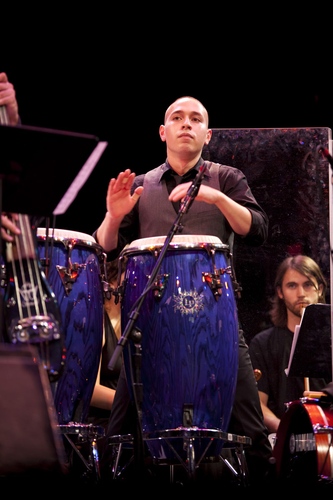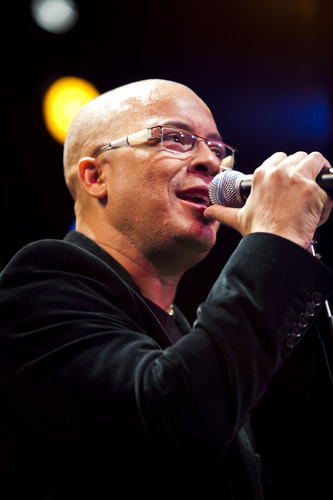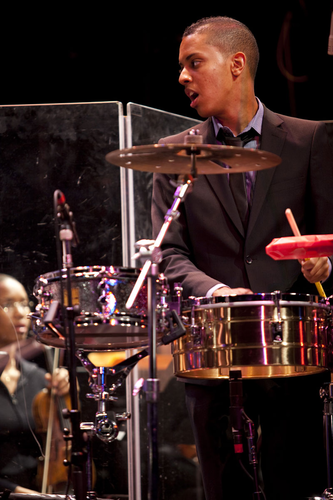Onstage with Issac Delgado

Paulo Stagnaro (center), onstage with Issac Delgado (right) and Anthony McKinney (left)
Photo by Kelly Davidson

Paulo Stagnaro on congas
Photo by Kelly Davidson

Issac Delgado
Photo by Kelly Davidson

Issac Delgado Jr. on piano
Photo by Kelly Davidson

Ilan Bar-Lavi and Anthony McKinney on guitar and bass
Photo by Kelly Davidson

Marcos Lopez on timbales
Photo by Kelly Davidson

Marcos Torres on bongos
Photo by Kelly Davidson

A pianist, keyboardist, guitarist, bassist, three percussionists, three singers, and 14 string players round out the band.
Photo by Kelly Davidson

Delgado has the audience on its feet.
Photo by Kelly Davidson
When Cuban salsa great Issac Delgado came to Berklee for a series of clinics and rehearsals before his big Berklee Performance Center concert, hand percussionist Paulo Stagnaro was front and center all week long. As part of the rhythm section, the performance major prepared for over a month for the concert, showed Delgado around campus, and even picked him up at the airport (at midnight on a Sunday, no less!). We talked to him about the experience. Below is a condensed and edited version of his comments.
What was it like preparing for this concert?
It was a lot of work! We did rehearsals with just the rhythm section at first, and then we had a full-band rehearsal in October, when everybody got the music. November 1 was the first time we had a rehearsal with the full band and all the arrangements. The music was tough. It wasn't something you could pick up and sight-read; it has several nuances particular to its style. It was a lot of work, but we had so much fun getting it done.
The last two rehearsals were probably the best, the one with his son and the one with his son and himself. Tuesday he had a clinic with the rhythm section—myself, bassist Anthony McKinney, and percussionist Marcos Lopez—and with his son, Issac Jr., on piano. It helped a lot that his son knows his repertoire inside and out. He's actually applying to Berklee. He studied at a classical conservatory in Cuba and has been touring with his father for the past five years. I think for him it was a really cool experience to see the school, because he'd never seen a music school on such a large scale. A music school with 4,000 kids is unheard of. We kicked it, I checked out a lot of his music, and hopefully he'll be studying here soon.
Had you met Issac Delgado before?
Kalani Trinidad and I met him at the Latin Grammy Awards in 2007. We went to play with the school as part of the Lifetime Achievement Awards ceremony, and he was the house band for the after-party. I was freaking out and didn't know what to say. Recently he recorded a new CD in New York, and I went to check out the session. A good friend of mine (and mentor), Pedrito Martinez, was playing on the record. But this time I got to hang a bit more, and see how he worked. After the week he spent in Boston, I was privileged enough to get to know him a little better. I even took him to get his hair cut at my barber. He's a really down-to-earth guy. When you think of singers who make music for other people—that cliché that they do it for the audience—that's the guy. He's super humble. It was cool to realize that somebody that's done so much still has his head on straight.
Was it entirely new music to most people in the band?
I would say at least half the band had been checking out Issac for a long time. His is actually the first music I remember hearing as a kid, ever. My mom used to play him when she was cleaning the house. Most of us in the rhythm section have been listening to his stuff for at least some time, but I think for the horns and the string section it was the first time they'd heard his music. So it was new; it was fresh.
Issac is still so new in the States because many of his prior recordings were not in circulation in the U.S. It was a rarity to get ahold of his stuff. He hasn't been to Boston in over a decade, and hadn't played in New York in quite some time until last summer, so it's still pretty new to most people.
I heard you were taking on a lot of responsibility in rehearsals.
I transcribed some parts for some of the charts, counted off the tunes, made sure the time was cool, and tried my best to establish the flow of the songs. I'm assertive in the sense that when I see something that needs to be done and I don't see anybody willing to stick their neck out and get in the line of fire, I do it. Sometimes it works out; sometimes it's a learning experience.
Was this a lot compared to what you've done in the past?
Maybe just the size. . . but I have my own band, a sextet that I gig a lot with. When we travel with Berklee it's called the Berklee Latin Jazz All-Stars, but outside Berklee it's La Timbistica. We've traveled a bunch with Berklee over the past two years and played some of the bigger U.S. festivals: Monterey, Duke Ellington, Puerto Rico, Saratoga. . . .
I just hope this serves as a beacon to see what is and what isn't at school right now. It definitely lets you see that there is the desire to have more exposure to Latin music in the Berklee community, for singers especially. For the students to be able to share an experience with somebody like Issac, that's what makes the Berklee experience so different from everything else.
